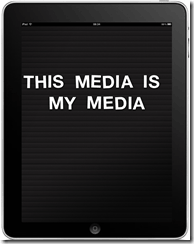Proof that the mobile really is personal media
 I read with interest the news that there is to be a class action brought against Apple for allegedly allowing personal information gleaned from iPhones and iPads to be sold to advertisers.
I read with interest the news that there is to be a class action brought against Apple for allegedly allowing personal information gleaned from iPhones and iPads to be sold to advertisers.
Apple is being sued sued over claims that applications for the company’s iPhone and iPad transmit users’ personal information to advertising networks without customers’ consent.
The complaint, which seeks class action, or group, status, was filed on December 23 in federal court in San Jose, California. The suit claims Cupertino, California-based Apple’s iPhones and iPads are encoded with identifying devices that allow advertising networks to track what applications users download, how frequently they’re used and for how long.
“Some apps are also selling additional information to ad networks, including users’ location, age, gender, income, ethnicity, sexual orientation and political views,” according to the suit.
This is not new. Companies have been selling (deemed “renting” in the direct market business) personal details for years. I have seen it happen first hand as the White Company on-sold my Wife’s address details to 10 other companies we had no relationship or interest in, and for months after we received a steady stream of irrelevant and useless marketing material to our private letterbox.
The only way we could stop this (and NO we had not consented by ticking boxes on the company’s website because there were no boxes to tick – as the DRM manager later admitted) was by directly contacting the CEO/Marketing manager of the offending company and reminding them about “section 11 of the data protection act”.
Quoting this to companies seems to do the trick every time – as it is the law and your right. Cut and paste the section below in your response – I find it speeds things up.
“I am requesting that under section 11 of the Data Protection Act that you immediately cease, or not to begin, processing for the purposes of direct marketing my personal data”.
So then why are people so enraged about this happening on their mobile, yet are more than happy for companies to bombard our homes with useless advertising messages on a regular basis?
The reason is simple – mobile is a a personal media device and we don’t like our personal [advertising] space being invaded.
Indeed when I speak at conferences around the world on mobile and social media, one of my opening activities has for a while has been to ask all of the delegates (largest audience was 800 in Amsterdam) to swap their mobiles with the person next to them, and then start going through the address book.
The audible unease that fills the room is constant in every country and language where I perform this exercise. You can see this in action from the video of my presentation at a Mobile Monday Amsterdam event from the point 4:20 in from the start.
We won’t give up our mobile even to someone we know well because it has become a incredibly personal device, so we are even more protective of what appears on the screen, and now also so it seems from the class action, about where our personal information is sent / rented / sold.
As Alan Moore points out in his excellent paper from 2008 “the glittering allure of the mobile society”, the the unique benefits of mobile are:
- Personal – my media
- Always carried – the city in my pocket
- Always on
- Built in payment
- Point of creative impulse
- Recounting the audience – the holy grail of advertising
The class action referenced above should concern those involved with mobile advertising, because it highlights a sharp shift in consumer behaviour.
As lazy marketers, we keep sending junk mail (as per my White Company example above) to people from rented lists, in the hope that one of us may buy our product or service. This DOES NOT translate to the mobile, because of the very personal nature of the device. Coupled with the rise and rise of social media, and peer advocacy we are seeing that the old ways of advertising and marketing are about to change.
The fact that advertisers are now seeking more personal information via mobile devices and consumers are resisting strongly should be an urgent wake up call that mobile advertising is broken (see a previous post on this very subject) and consumers are now wise to the tricks being employed.
Mobile is personal – and we need a different approach to provide valuable and relevant services to this very unique channel.